

Stages of memory. Saul McLeod, published 2013 “Memory is the process of maintaining information over time.”
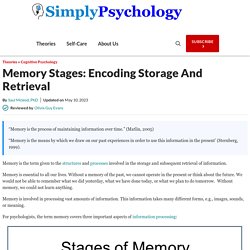
(Matlin, 2005)“Memory is the means by which we draw on our past experiences in order to use this information in the present’ (Sternberg, 1999). Memory is the term given to the structures and processes involved in the storage and subsequent retrieval of information. Memory is essential to all our lives. Without a memory of the past, we cannot operate in the present or think about the future. FORGET ME NOT! How Does Memory Works? The more you know about your memory, the better you'll understand how you can improve it.
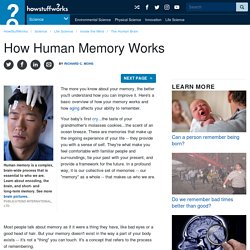
Here's a basic overview of how your memory works and how aging affects your ability to remember. Your baby's first cry...the taste of your grandmother's molasses cookies...the scent of an ocean breeze. These are memories that make up the ongoing experience of your life -- they provide you with a sense of self. They're what make you feel comfortable with familiar people and surroundings, tie your past with your present, and provide a framework for the future.
What Is Memory? Have you ever wondered how you manage to remember information for a test? The ability to create new memories, store them for periods of time, and recall them when they are needed allows us to learn and interact with the world around us. How to Improve Your Memory: Tips and Exercises to Sharpen Your Mind and Boost Brainpower.
Whether you’re looking to sharpen your mind, boost your mental performance, or preserve your memory as you age, these tips can help. How to boost brain power at any age A strong memory depends on the health and vitality of your brain. Whether you’re a student studying for final exams, a working professional interested in doing all you can to stay mentally sharp, or a senior looking to preserve and enhance your grey matter as you age, there’s lots you can do to improve your memory and mental performance. They say that you can’t teach an old dog new tricks, but when it comes to the brain, scientists have discovered that this old adage simply isn’t true. The human brain has an astonishing ability to adapt and change—even into old age.
Memory issues in aging and prevention. The Non-Alzheimer’s Causes Of Memory Loss. As we and our loved ones age, it’s reasonable to occasionally forget things—we all do it at some points.
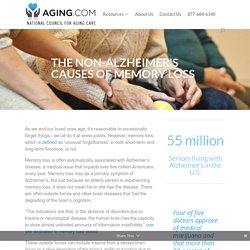
However, memory loss, which is defined as “unusual forgetfulness” in both short-term and long-term functions, is not. Memory loss is often automatically associated with Alzheimer’s disease, a medical issue that impacts over five million Americans every year. Memory loss may be a primary symptom of Alzheimer’s, but just because an elderly person is experiencing memory loss, it does not mean he or she has the disease. There are often outside forces and other brain diseases that fuel the degrading of the brain’s cognition. “The indications are that, in the absence of disorders due to trauma or neurological disease, the human brain has the capacity to store almost unlimited amounts of information indefinitely,” one site dedicated to memory loss stated. Memory screening for those who keep forgetting things, Health News. Being forgetful can simply be a reflection of ageing - but it can also spell something more sinister.

It may, for instance, point to a heightened risk of getting dementia down the line. People who have memory- related or cognitive problems - such as in making decisions or judging the steps needed to carry out a complex task - may benefit from a memory screening test. Memory screening is like a health check-up for the brain. It can help uncover the possible reasons behind difficulties associated with remembering things and other cognitive functions, said Dr Kinjal Doshi, principal clinical psychologist at the neurology department of the Singapore General Hospital (SGH). Memory screening is usually done in hospitals. Signs & Symptoms of Memory Loss - Memory Problems. Memory Problems Signs and Symptoms Memory problems can vary in severity and cause different types of signs and symptoms.
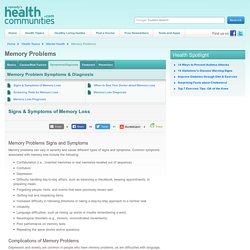
Common symptoms associated with memory loss include the following: Confabulation (i.e., invented memories or real memories recalled out of sequence) Confusion Depression Difficulty handling day-to-day affairs, such as balancing a checkbook, keeping appointments, or preparing meals Forgetting people, facts, and events that were previously known well Getting lost and misplacing items Increased difficulty in following directions or taking a step-by-step approach to a familiar task Irritability Language difficulties, such as mixing up words or trouble remembering a word Neurological disorders (e.g., tremors, uncoordinated movements) Poor performance on memory tests Repeating the same stories and/or questions.
Memory loss: 7 tips to improve your memory. Memory loss: 7 tips to improve your memory Try these simple ways to improve your memory.
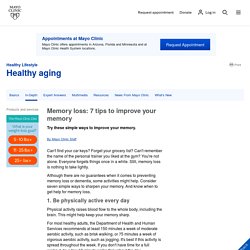
By Mayo Clinic Staff Can't find your car keys? Forget your grocery list? Can't remember the name of the personal trainer you liked at the gym? 10 Brain Exercises That Boost Memory. A Whole-Body Approach to a Healthy Brain So what types of exercises benefit your brain?
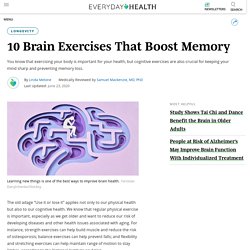
Research shows that when it comes to keeping your mind sharp, exercising your body as well as your mind and sticking to healthy habits is the ideal formula. A study published in July 2019 in The Journal of the American Medical Association followed 196,383 participants age 60 and older who did not have cognitive impairment or dementia when they joined the study and tracked data for eight years on factors such as current smoking status, regular physical activity, healthy diet, and moderate alcohol consumption. They found that a healthy lifestyle was associated with a lower dementia risk among participants, regardless of genetic risk for Alzheimer’s disease and related dementias. Another study on the connection between lifestyle and dementia risk published in December 2013 in PLoS One, found that people who participate in multiple healthy behaviors significantly reduce their risk for dementia.